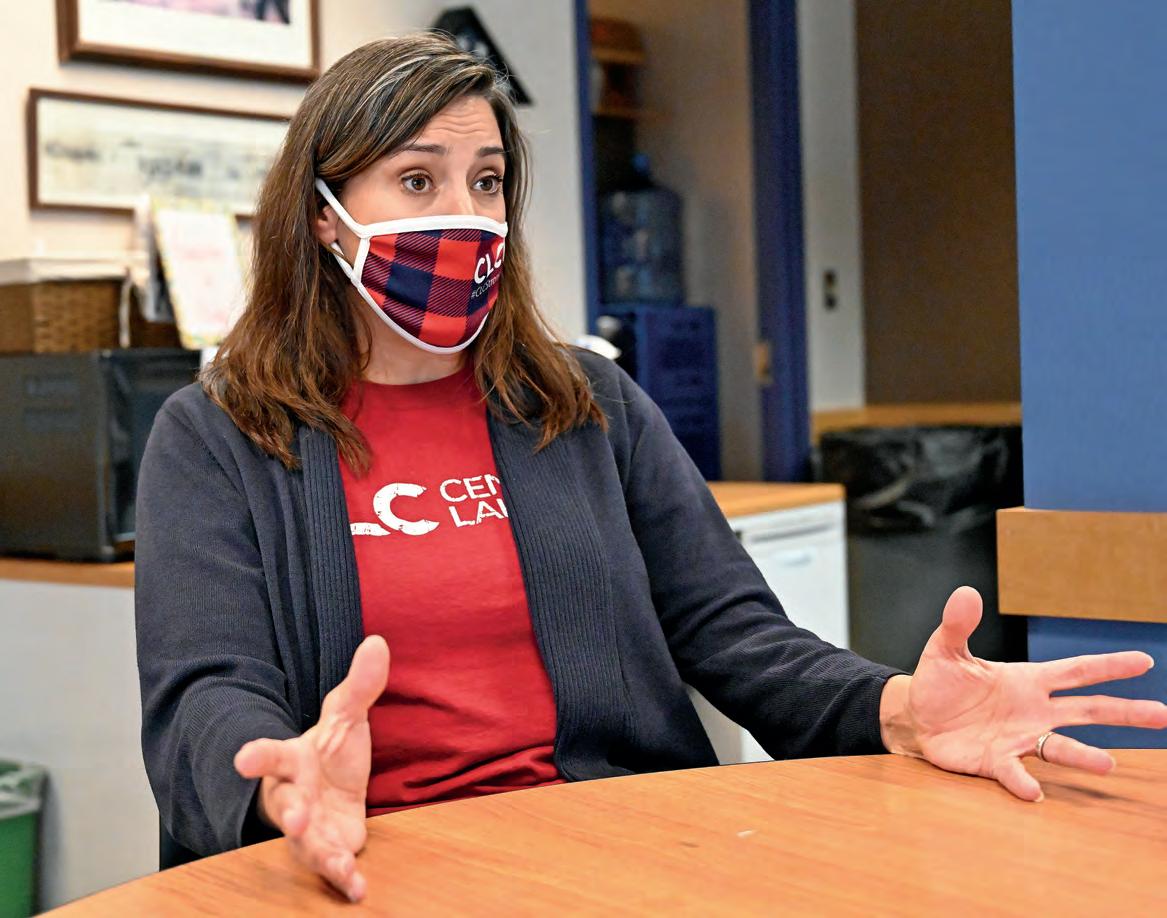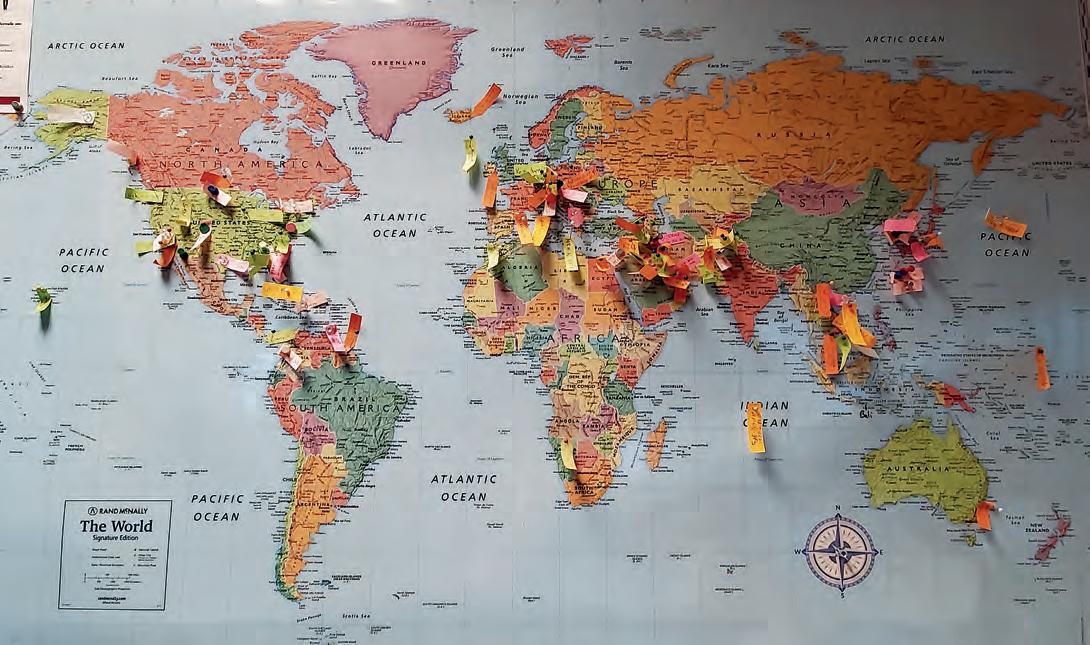
7 minute read
Reaching out
As a veteran of the North Dakota National Guard who was deployed in Iraq, Theresa Harsha understands the needs of veterans who return home from duty. She helps meet those needs as coordinator of the Central Lakes College Veterans Resource Center. Steve Kohls / Brainerd Dispatch
All are welcome at CLC Veterans Resource Center
By Theresa Bourke | Brainerd Dispatch
Theresa Harsha never thought she’d actually get the job when she interviewed for a position at Central Lakes College in 2014.
After being a stay-at-home mom for years, she just wanted to get her feet wet with a couple interviews to ease her way back into the work environment before starting to look seriously. But when the National Guard veteran and former teacher got the offer to be the veterans resource center coordinator at CLC, she jumped right in.
“It married the parts — the military part and the education part — into a perfect storm,” she said Wednesday, Oct 7, in her office at the Brainerd college.
Now Harsha uses her military experience and her masters degree in education to support student veterans and their families and help them navigate the college world.
“I’m very proud of the work we do here. And you’re probably going to see me in the same office 20 years from now, knock on wood,” she said. “I could see myself doing this for a long time.”
Don Pfeffer certainly hopes that’s the case, too, as the driving force behind the center’s very existence.
A Vietnam War veteran who suffers from post-traumatic stress disorder, the Little Falls native came up with the idea when he taught at CLC in the early 2000s.
“I saw a lot of veterans come into the college that needed help,” he said, recounting his time stationed in Thailand working working with U.S. Air Force intelligence.
“When all of us came home, we were basically ignored,” Pfeffer said of Vietnam veterans.
He already had a masters degree but was denied two jobs because of his military background. The stigma surrounding him and his comrades deterred them from even talking about their service.
Harsha understands some of those challenges, too, going through hardships of her own after returning from a deployment to Iraq with the North Dakota National Guard in 2004.
“Personally speaking, when you come back, you feel like no one understands you,” she said. “You’re just feeling kind of like that square peg in a round hole. Where do I fit? What is my next mission? What is my purpose?”
Those are the reasons Pfeffer wanted to start a community veterans center.
“The goal of myself and the other community veterans was to make sure that returning veterans would not face that stigma, and particularly as they were coming back into the community,” he said.
After doing his research, he found there weren’t really any veteran resource programs at colleges in Minnesota, and frankly very few across the country.
So Pfeffer created the center at CLC in February 2006, acting as director and working with the Legislature and Minnesota Department of Veterans Affairs to secure funding.
Then he took his idea further, traveling throughout the state to help other colleges do the same thing. Pfeffer said he has been to every public college and university in Minnesota at least once and has visited most of the private schools as well. He has even gone national, speaking at conferences and schools all over the country about his success at CLC.
“People can’t believe that that little college did what it did,” he said.
And what the college did has not gone unnoticed.
Last year CLC earned recognition from Beyond the Yellow Ribbon, a statewide program that recognizes businesses and organizations for their dedication to serving service members and military families. To earn the honor, CLC had to submit a comprehensive plan, along with its programs and policies that support vets. After the acceptance, CLC joined the ranks of the Minnesota Twins and 3M.
“We were really excited for that,” Harsha said.
Then came the honor from “Military Times” as No. 1 on the ranking of Best Colleges for Veterans among two-year schools in 2020.
But awards aside, what CLC did was create a place for veterans and current military service members — young and old — to get the support they need both inside and outside school.
In the school setting, Harsha handles GI Bill benefits and often refers veterans to academic advisers on campus for the fields they choose.
Outside of education, veterans can get housing, food and even financial support through the center.
“A lot of times we have students that come to campus, and they don’t have a place to live. They’re couchsurfing,” Harsha said. “So I reach out to MACV (Minnesota Assistance Council for Veterans), which supports housing for veterans and see if they can help.”
CLC has its own food shelf available to all students, but sometimes the resource center can also help veterans out with gift cards for groceries or gas.
“While it might not be a big fix, it helps in the short term,” Harsha said, noting she also connects veteran students with other community organizations, like the American Legion, Crow Wing County Veterans Services and the Veterans of Foreign Wars. While these supports are offered to veterans and their families, the center also has the random acts of kindness — or RAK — fund available solely to veterans. This donation-driven fund provides up to $500 in the case of an emergency, like a broken furnace or car repairs or something of that nature.
“And that would then allow the student to maybe not have that burden, like they were going to use the rent check to pay for this,” Harsha said. “Now they can pay the rent check.”
In pre-COVID-19 times, the center was also a place for community veterans outside CLC to gather and support one another.
Pfeffer and a group of older vets came to campus a couple times a week for lunch and dinner to share food and fellowship.
“Veterans will talk more with the other veterans, in particular the older veterans that were coming to the groups,” Pfeffer said. “This was one of the few places they would go to interact with veterans.”
============ ============
VETERANS RESOURCES
For more information on the Central Lakes College Veterans Resource Center, visit clcmn.edu/veterans-resourcecenter/ or call 218-855-8279.
Minnesota State military support services: minnstate.edu/military/, 800-456-8519
GI Bill application: va.gov/education/
CLC scholarships: clcmn.edu/scholarships/
CLC financial aid: clcmn.edu/financial-aid/
Minnesota Department of Veterans Affairs: mn.gov/mdva/, 1-888-546-5838
Minnesota county veterans service officers: www.macvso.org/ Education assistance:
• Army — goarmyed.com/login.aspx, 1-800-817-9990
• National Guard — minnesotanationalguard.ng.mil/ education/, 651-282-4589
• Air Force active duty — 210-565-9470
• Air Force reserve — 720-847-3715
• Navy — 850-473-6063
============ ============
He has always worked to get younger veterans involved in the groups as well. That happened more early on in the center’s life but not so much anymore, as many of the younger vets haven’t seen combat, he said, and don’t feel as much of a need to reach out.
But no matter the military experience — from basic training up to combat — all service members past and present are welcome at the CLC Veterans Resource Center.
“I say, if that chair right there in my office could tell stories, I’d have a bestseller on my hands. I wouldn’t have to work,” Harsha joked, pointing to the otherwise ordinary-looking chair next to her desk.
“There have been many tears shed in that office, not just by the students, but by me as well, dealing with these issues that they have,” she continued. “And sometimes that’s all you can do is cry with them and hold their hand. And there’s also been many, many, many times when we’re just rolling laughter.”

A world map in the veterans resource center at Central Lakes College has markers placed on every place vets who have visited the center have been. Clusters are apparent in the Middle East and southeast Asia near Vietnam.
Theresa Bourke / Brainerd Dispatch
Another flood of emotion comes when Harsha gets to see students she helped walk across the stage to get their diploma.
“You know their struggles, you know their hard work, you know what they had to put in and sacrifice to be there,” she said.
As a kid, Harsha graduated from high school the same year her mom earned a two-year college degree.
“So I see these parents coming back, trying to do it, and I am like, ‘You have no idea the profound impact you are having on your children right now,’” she said.
An impact aided by something that started out as one man’s idea to help his military comrades feel more accepted in society than he did.
“It was kind of a promise we made,” Pfeffer said, “which was never again will that kind of treatment be provided to our veterans returning home.”
THERESA BOURKE
218-855-5860 bourke@brainerddispatch.com Twitter: www.twitter.com/DispatchTheresa



